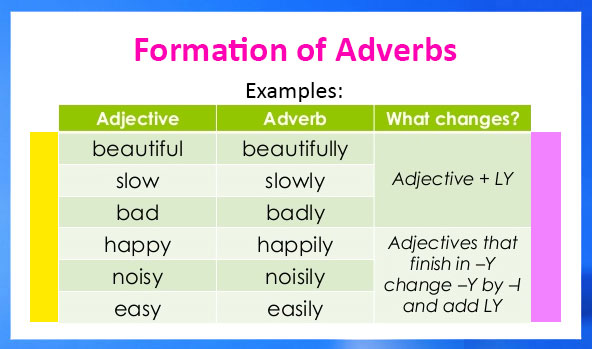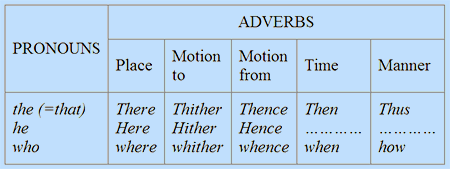
Formation of Adverbs
Adverbs can be formed in a number of ways.
1. Adverbs of manner are mostly formed from Adjectives by adding ly.
Examples:
clever - cleverly
wise – wisely
kind – kindly
foolish – foolishly
quick- quickly
beautiful – beautifully
2. When the Adjective ends in y preceded by a consonant, change y into i and add ly.
Examples:
happy – happily
ready – readily
heavy – heavily
3. When the Adjective ends in le, simply change e into y.
Examples:
single – singly
double – doubly
4. Some Adverbs are made up of a Noun and a qualifying Adjective.
Examples:
Sometimes, meantime, meanwhile, yesterday, midway, otherwise.
5. Some Adverbs are compounds of on (which is weakened to a) and a Noun.
Examples:
afoot (=on foot)
abed, asleep, ahead, aboard, away
6. Similarly there are other Adverbs which are also compounds of some Preposition and a Noun.
Examples:
betimes, besides, today, tomorrow, overboard
(Note: The word be is an old form of the preposition by)
7. Some Adjectives are compounds of a Preposition and an Adjective.
Examples:
abroad, along, aloud, anew, behind, below, beyond.
8. Some adverbs are compounds of a Preposition and an Adverb.
Examples:
within, without, before, beneath.
9. There is a class of Adverbs which are derived from the Pronouns the (=that), he, who.

10. Many of the above Adverbs are compounded with Prepositions. Thus we get –
thereby, therefrom, therein, thereof, thereon, thereto, therewith;
hereafter, hereby, herein, hereupon, herewith;
wherefore, wherein, whereon, whereof;
hitherto;
thenceforth, thenceforward;
henceforth, henceforward.
11. Two adverbs sometimes go together, joined by the Conjunction and.
Examples:
again and again (= more than once, repeatedly)
by and by (=before long, presently, after a time)
far and near (=in all directions)
far and wide (=comprehensively)
far and away (=by a great deal, decidedly, beyond all comparison)
first and foremost (=first of all)
now and then (=from time to time, occasionally)
now and again (=at intervals, sometimes, occasionally)
off an on (=not regularly, intermittently)
once and again (=on more than one occasion, repeatedly)
out and away (=beyond comparison, by far)
out and out (=decidedly, beyond all comparison)
over and above (=in addition to, besides, as well as)
over and over (=many times, frequently, repeatedly)
through and through (=thoroughly, completely)
thus and thus (=in such and such a way)
to and fro (=backwards and forwards, up and down)
Was this article useful? What should we do to improve your experience? Share your valued feedback and suggestions! Help us to serve you better. Donate Now!








